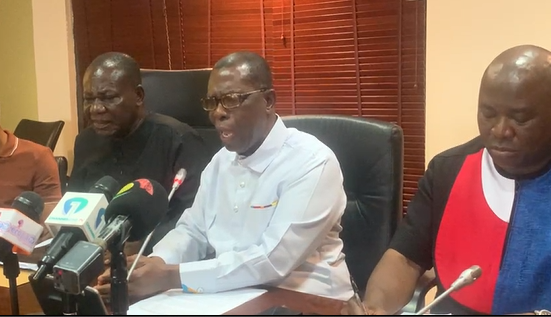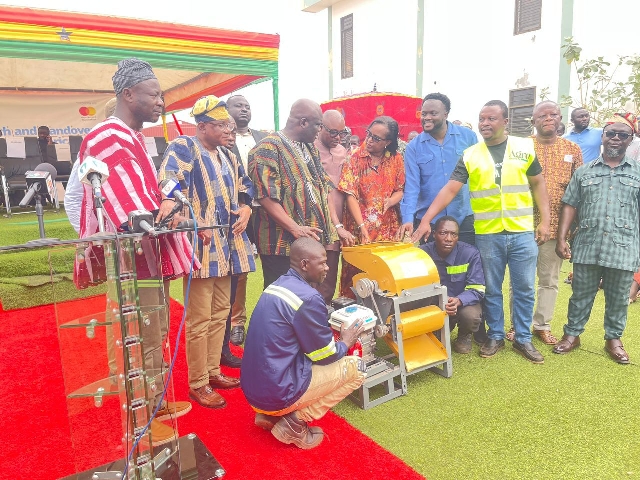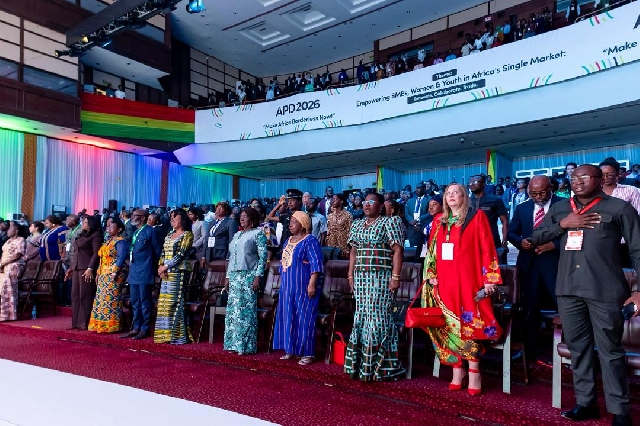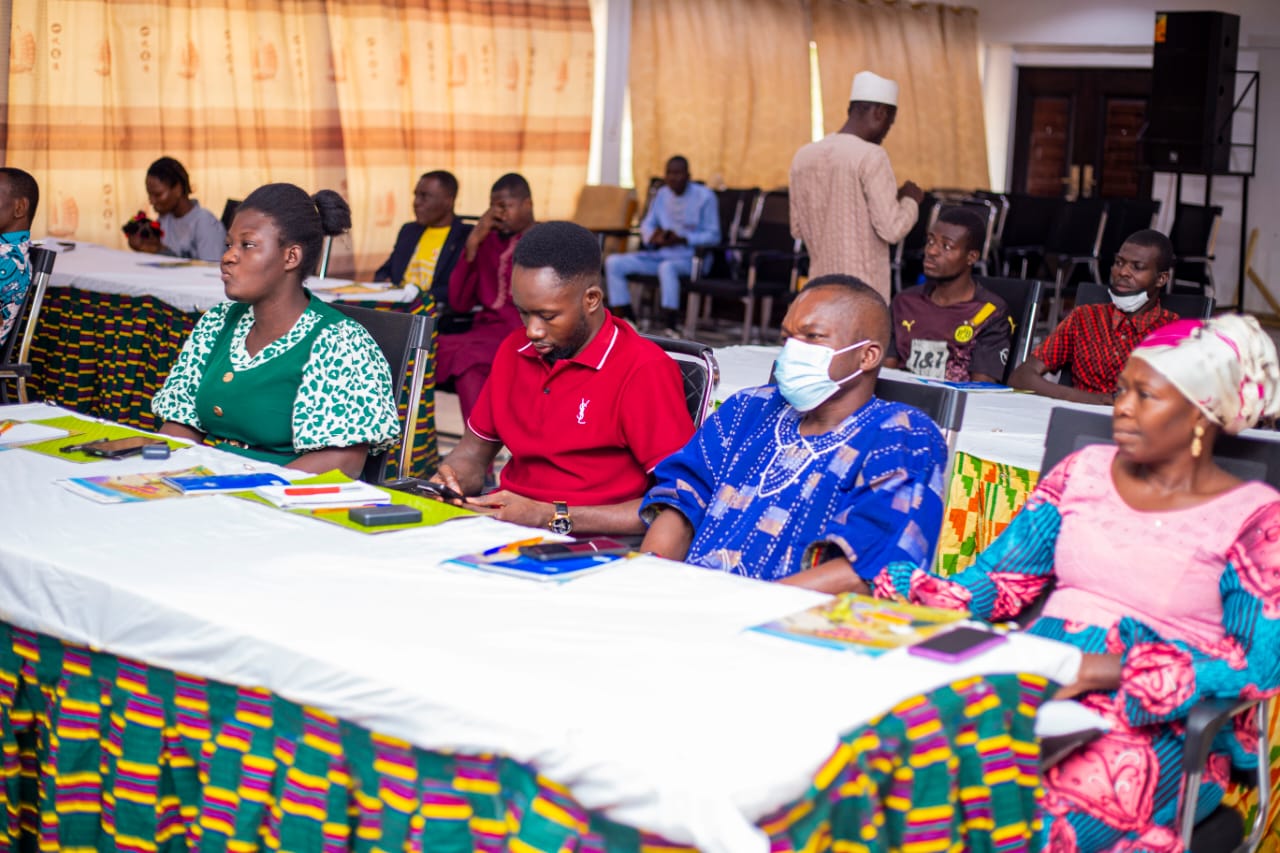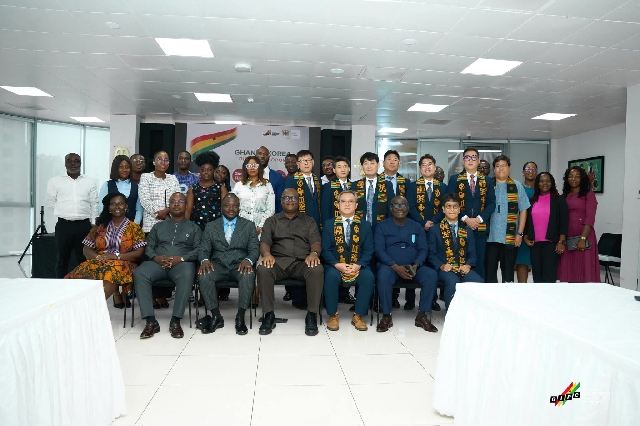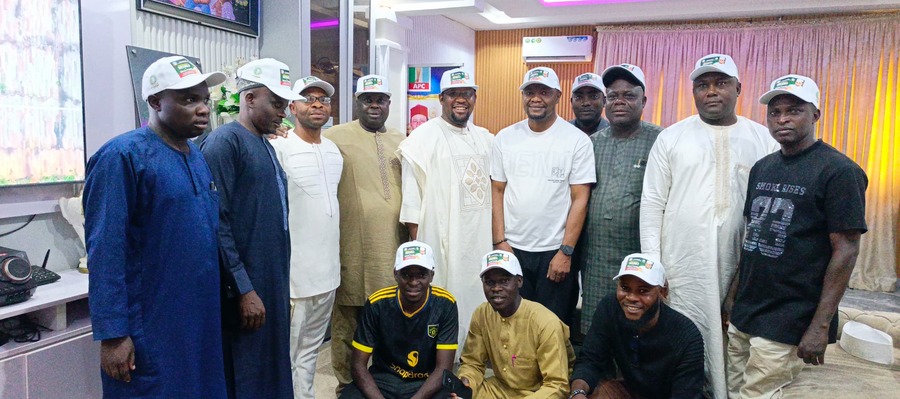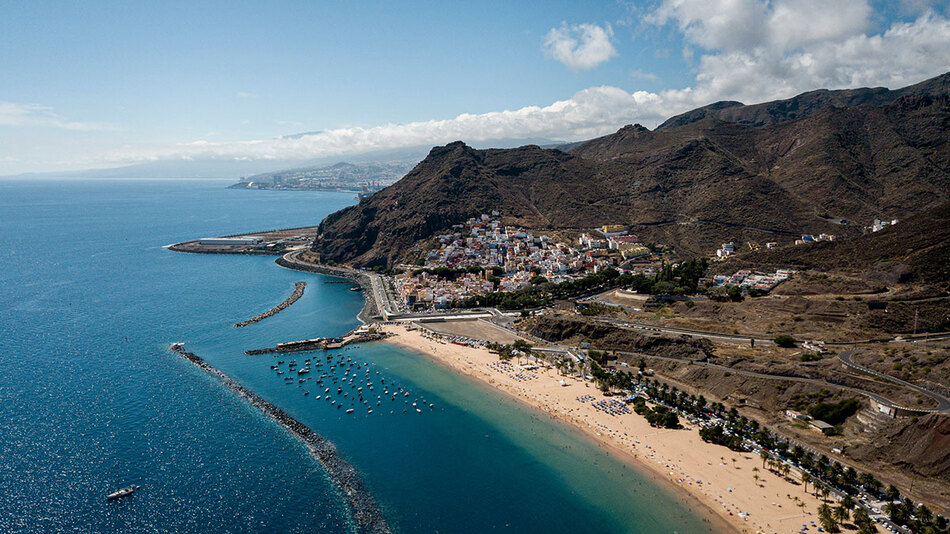The APC Climate Change Network (ACCN), a support group aligned with Nigeria’s ruling All Progressives Congress (APC), has pledged its support to Hon. Haruna Shekwolo Ushafa, the party’s chairmanship candidate for the upcoming Federal Capital Territory (FCT) Area Councils elections in Bwari. Members of the network paid a courtesy visit to Ushafa at his residence in Ushafa, Bwari, on Tuesday, underscoring their commitment to backing his campaign with grassroots mobilization and climate-focused advocacy. Speaking during the visit, ACCN National Coordinator, Citizen Greg Odogwu, said the group was “strongly behind” Ushafa and would support his campaign through the distribution of flyers and the promotion of environmental sustainability principles throughout and beyond the election period. Odogwu described the candidate as “Sustainable Shekwolo,” citing his experience, leadership style, and track record as indicators of his capacity to build climate resilience in Bwari Area Council if elected. “His pedigree, experience, and body language show that he understands the issues and has what it takes to make Bwari climate-resilient,” Odogwu said. In response, Ushafa acknowledged the growing impact of climate change and emphasized the need for urgent action at the grassroots level. He said his team recognizes climate change as a real and pressing challenge, particularly for rural communities whose livelihoods depend heavily on agriculture. “There are many things that must be done to make our Area Council resilient and to improve the lives of our people, especially rural farmers,” Ushafa said. “We can adopt climate-smart agriculture and upgrade agricultural facilities, which will automatically improve livelihoods.” He also highlighted the economic costs of climate change, pointing to erosion and infrastructure degradation as major challenges facing the area council. “When erosion caused by climate change is not controlled, it accelerates the deterioration of roads,” Ushafa noted. “As a result, we incur significant economic losses as an Area Council. We look forward to working closely with your network.” Also speaking at the event, the ACCN Coordinator for Bwari, Hon. Charles Nwokedi, reaffirmed the group’s support for Ushafa, noting that the network has a presence across all wards in Bwari Area Council. “We are solidly behind you,” Nwokedi said. “With our structures across the wards, we are on standby to support your campaign efforts.” The FCT Area Councils elections are expected to be closely watched, with climate resilience and sustainable development emerging as key themes in local governance debates. Background: APC Climate Change Network The APC Climate Change Network is an organized cadre of party members and climate advocates within the APC, formed to elevate environmental issues and climate action within the party’s agenda and outreach strategy. The network describes itself as a coalition of “climate champions” drawn from wards, local governments, and states across Nigeria, aiming to promote awareness of climate change, carbon literacy, and green transitions among party members and constituents. It supports the party’s alignment with national climate policies and the federal government’s climate action and energy transition goals. Since its convening in 2022, the ACCN has engaged in initiatives such as advocating for sector-specific climate action plans within the APC, organizing climate policy dialogues, and endorsing candidates whose platforms emphasize sustainable development. Source: Apexnewsgh.com
The experiment of Biochar by the Millar Institute proves massive results
On the fertile fields of the Millar Institute for Transdisciplinary and Development Studies, a quiet revolution is taking root, one that promises to transform the lives of farmers across Ghana and contribute to a greener planet. Last season, the Institute launched the Grass Biochar Experiment, an ambitious initiative to test the power of biochar as a sustainable organic fertilizer. The experiment began on a modest test farm, where researchers blended biochar into the soil and closely monitored its effects on crop growth and soil health. As the weeks unfolded, the results exceeded all expectations: crops grew stronger and healthier, soil fertility improved dramatically, and yields soared. The implications of these findings extend far beyond the test plots. Biochar, produced from plant material, offers a cost-effective and environmentally friendly alternative to traditional synthetic fertilizers. Its use not only boosts agricultural productivity and food security but also holds promise for mitigating climate change by sequestering carbon in the soil. “We are thrilled with the results of the Grass Biochar Experiment,” announced the President of the Millar Institute, reflecting the excitement spreading through the agricultural community. “Biochar has the potential to revolutionize agriculture in Ghana, and we look forward to working with farmers and stakeholders to promote its adoption.” Encouraged by these remarkable outcomes, the Millar Institute is preparing to expand the experiment. Plans are underway to collaborate with farmers throughout Ghana, tailoring biochar techniques to different environments and crop needs. This initiative is part of the Institute’s ongoing commitment to sustainable agriculture, environmental stewardship, and innovative solutions for rural livelihoods. As the Grass Biochar Experiment continues to grow, so does the hope for a more productive, resilient, and environmentally conscious agricultural sector in Ghana. The Millar Institute stands at the forefront of this movement, empowering farmers with new tools and knowledge to nurture their land—and the future. Source: Apexnewsgh.com
Mediterranean’s Dark Catch: Climate Change and Lax Oversight Enable IUU Fishing
Illegal fishing continues to infiltrate European markets, driven by weak import controls, opaque ownership structures, and loopholes in port inspections. A recent study commissioned by Oceana reveals that the EU’s long-distance fleet is more than twice as large as officially reported when foreign-flagged vessels owned by EU companies are included. But experts warn that climate change is compounding the problem, creating new pressures on fish stocks and pushing illegal operators deeper into the shadows. Warming seas and shifting fish populations are making once-abundant species harder to find in traditional fishing grounds. This fuels competition, driving some operators to cut corners or deliberately bypass rules. “Climate change reduces availability in certain areas, and when demand stays high, illegal fishing fills the gap,” said one investigator. Weakened stocks also make it easier for fishers to launder catches. When species decline due to warming waters, it becomes harder for authorities to distinguish between legally caught and illegally sourced fish, especially when imports rely on paper-based catch certificates that are easy to forge. At major landing sites, like Palermo in Italy, investigators uncovered networks of intermediaries and “fishlanders” mixing illegal and legal catches. “It’s like a fish laundry, once mixed, you cannot tell which fish is legal and which is not,” one source explained. Transforming and processing plants add another layer of opacity, where forged certificates enable illegally caught fish to be exported to the EU undetected. Industrial vessels are supposed to carry AIS satellite trackers, but many disappear from platforms such as MarineTraffic or Global Fishing Watch. Climate-driven changes in fish distribution mean fleets travel further and stay at sea longer, sometimes transferring catches to container ships offshore to avoid scrutiny. Meanwhile, powerful artisanal vessels, such as those seen in Tunisia, remain invisible to tracking systems despite operating with industrial-scale engines. Ownership remains one of the weakest points of oversight. Many vessels are linked to shell companies in tax havens, making accountability nearly impossible. In Malta, authorities uncovered a “company” that turned out to be little more than a postbox, shielding Russian owners behind layers of intermediaries. A global review of 19,000 large vessels found that 62% had no ownership records in leading databases. Spain, France, China, and Taiwan, all major fleets, were among the worst performers. The EU’s footprint is even larger than reported: more than 344 EU-owned vessels are flagged in 43 non-EU countries, from Panama to Senegal. Spain, the Netherlands, and Italy dominate these offshore registrations. In some cases, one in four vessels is flagged to countries with poor fisheries governance, flagged as tax havens, or already warned by the EU. This undermines both EU rules and global fisheries agreements. As rising sea temperatures and acidification drive species into new waters, weak governance and opaque ownership will continue to enable illegal actors to profit. Without strong digital certification systems, transparent ownership registries, and stricter port inspections, climate change will only widen the gap between demand and legal supply. “If we don’t know who owns the vessels, where the fish really comes from, or how it gets to our plates, illegal fishing will continue to thrive, and climate change makes the problem even worse.” Source: Apexnewsgh.com Email: apexnewsgh@gmail.com
NRA and NCA Join Forces to Tackle Telecom Radiation Risks
Ghana’s telecommunications sector is set for tighter oversight as the Nuclear Regulatory Authority (NRA) and the National Communications Authority (NCA) embark on a groundbreaking partnership to ensure public safety and strict emission standards. The collaboration, announced by Professor Emmanuel Ampomah-Amoako, Director of Nuclear Installations at the NRA, during a nationwide training workshop for selected journalists on August 27, 2025, signals a major step forward in telecom regulation. “As we speak, the NRA is working with the NCA to regulate the telcos, and it’s work ongoing,” Professor Ampomah-Amoako revealed, stressing that this alliance goes beyond emissions to address the broader operations of telecom companies. With the NRA now taking over the responsibilities of the former Radiation Protection Board, its regulatory scope has expanded to cover vital telecom infrastructure, most notably, mobile phone masts that have sparked public concerns over potential radiation exposure. The NCA, meanwhile, will continue to manage licensing and operational compliance, making sure telecom operators meet rigorous technical and safety standards. Professor Ampomah-Amoako highlighted that the focus isn’t solely on enforcement: “It is also about the functioning of the telcos, which the NCA provides the final authorization,” he explained. The partnership seeks to guarantee that telecom companies operate safely and within internationally approved emission limits. The joint regulatory initiative is designed to protect public health and restore confidence in telecom services, especially as infrastructure rapidly expands into residential areas. By ensuring radiation levels remain within global safety guidelines, the NRA and NCA aim to reassure Ghanaians that their connectivity is not only fast, but also safe. Source: Apexnewsgh.com
Environmental Group Sounds Alarm Over Tree Felling Along Atomic-Kwabenya Highway
A Rocha Ghana, an environmental advocacy organization, has raised significant concerns regarding the ongoing destruction of trees along the Atomic-Kwabenya Highway. Apexnewsgh reports The group is calling on the Ghana Atomic Energy Commission (GAEC) to take immediate action to stop this practice and to embrace more sustainable methods of urban development. In a statement issued on Tuesday, May 20, A Rocha Ghana characterized the tree removals as “indiscriminate” and highlighted the broader implications for the environment. They warned that the continued deforestation poses a severe threat to local biodiversity, exacerbates urban heat, and ultimately leads to long-term ecological damage. “The felling of trees along the Atomic-Kwabenya Highway must cease immediately. A clear, enforceable plan for replanting and maintaining green cover is essential,” the group asserted, emphasizing the need for responsible stewardship of green spaces in urban environments. A Rocha Ghana advocated for a policy where any tree that is cut down should be replaced with at least two native species in suitable locations, accompanied by strict monitoring protocols to ensure their growth and survival. The organization stressed that sustainable urban development should balance infrastructure advancement with ecological responsibility. The group referenced a specific instance from the previous year, where two trees were “hurriedly felled” with support from the GAEC to accommodate the establishment of a fuel station near the Maker’s House Chapel. A Rocha questioned how such approval was granted for a development within a sensitive wetland zone situated between the Atomic Police Station and the GAEC entrance. “This development is very unfortunate and needless. Urban Roads had to pause construction works after public outcry to redesign the road to protect the trees. Now that the plan is set, other agents are going in to deliberately destroy the trees gradually. This is environmental sabotage and shameful,” the statement read. Furthermore, A Rocha Ghana criticized what they described as a “lazy approach” to urban forestry, where trees are often removed at the slightest perceived risk without taking measures to preserve or manage them properly. “The health of city residents and the ecological resilience of our urban spaces depend on proactive and progressive forest management. We must act now to prevent further environmental harm,” the organization concluded, imploring stakeholders to prioritize the environment in urban planning. Source: Apexnewsgh.com
Ghana Police Storm Forest Reserve, Arrest 26 in Major Illegal Mining Bust
Ghana Police have raided a forest reserve near Samreboi in the Western Region, leading to the arrest of 26 individuals involved in the unlawful extraction of gold. Apexnewsgh reports The operation, which revealed deep-rooted issues related to environmental degradation, saw six Chinese nationals, two Koreans, and eighteen Ghanaians apprehended as they worked within a protected area. The meticulously coordinated raid was executed by elite units of the Ghana Police, including the Intelligence Directorate, the Criminal Investigations Department, the National Operations Directorate, and the Formed Police Unit. The intelligence-driven operation emerged from the urgent need to combat illegal mining activities that have ravaged Ghana’s forests and polluted its waterways. What has sent shockwaves through the political landscape is the connection drawn between this illegal mining site and Akonta Mining Company, owned by Bernard Antwi Boasiako—better known as Chairman Wontumi, the Ashanti Regional Chairman of the ruling New Patriotic Party (NPP). While this isn’t the first time Wontumi has been linked to controversies surrounding gold mining, the scale and organization of this bust have cast new light on the magnitude of the problem and the political entanglements involved. Upon arrival, law enforcement officials uncovered a staggering amount of mining and security equipment, including eight excavators (with five left behind due to logistical complications), two Toyota Hilux pickups, a Toyota RAV4, four motorbikes, and a myriad of tools and firearms. The cache underscored the extent of illegal operations that have left the forest scarred—trees flattened, land gouged, and water bodies poisoned, impacting local communities that depend on these resources. Inspector General of Police, Christian Tetteh Yohuno, hailed the professionalism of the police in carrying out the operation and reiterated their commitment to fighting illegal mining. “This operation marks a significant step in our battle against environmental terrorism. We are determined to protect our nation’s natural resources for future generations,” he asserted. Currently, the suspects remain in custody, poised to face legal proceedings in the upcoming days. The political ramifications of this incident are already igniting public debate, especially as Ghana approaches an election season where issues of galamsey, corruption, and environmental governance are set to dominate the discourse. Environmental advocates are urging for an independent inquiry into the political protection that clandestine mining operations seem to enjoy, while opposition parties are calling for greater transparency and accountability from those in positions of power. The unfolding events not only expose a glaring environmental crisis but also highlight the complex interplay of politics and illegal mining in Ghana. Source: Apexnewsgh.com
Prof. Michael Ayamga-Adongo Commends MP Murtala Mohammed for Environmental Advocacy
A notable expression of admiration resonated across social media as Associate Professor Michael Ayamga-Adongo took to his Facebook wall to share his thoughts on a commendable government appointee. Apexnewsgh reports The focus of his praise was none other than Ibrahim Murtala Mohammed, the dedicated Member of Parliament for Tamale Central and Minister of the Ministry of Environment, Science, Technology and Innovation. In a world where many merely pay lip service to the pressing issue of illegal mining, or “gallamsey,” Prof. Ayamga-Adongo highlighted Mohammed’s genuine enthusiasm and commitment to the cause of preserving Ghana’s environment. “Many just say fight gallamsey because it’s popular,” he noted. “However, one person who stands out as truly passionate about our environment and promoting sustainable extractivism is Hon. Ibrahim Murtala Mohammed.” The professor emphasized that this dedication extends beyond public appearances, asserting that Mohammed’s commitment is as evident in private discussions as it is in his public endeavors. He believes that environmental preservation and the transition to sustainable extractivism must go hand in hand, reinforcing the need for a balanced approach to Ghana’s natural resources. With an inspiring sense of readiness, Prof. Ayamga-Adongo concluded, “His boots are laced and ready for the challenge.” His heartfelt endorsement underscores that while many may talk the talk, there are few who walk the walk with the same level of passion and integrity as Ibrahim Murtala Mohammed. Source: Apexnewsgh.com
EPA CEO Prof. Nana Ama Browne Klutse Vows to Protect Ghana’s Environment
Prof. Nana Ama Browne Klutse, the newly appointed Chief Executive Officer of the Environmental Protection Authority (EPA), has reaffirmed her commitment to protecting and preserving Ghana’s environment. Apexnewsgh reports In a statement on her X page, Prof. Klutse expressed her dedication to upholding the EPA’s mission, following a meeting with outgoing Executive Director Mr. John Kingsley Krugu on January 22. The meeting aimed to ensure a seamless transition of leadership, with Mr. Krugu providing Prof. Klutse with a comprehensive briefing on the current state of affairs at the EPA. A key highlight of the briefing was the institution’s elevation from an agency to an authority, granting it a broader mandate to protect Ghana’s environment. Prof. Klutse, a renowned climatologist and lecturer at the University of Ghana, has an impressive track record of research and publications focused on climate dynamics, variability, and impacts assessment. Her expertise will undoubtedly be invaluable in driving the EPA’s mission forward. With her commitment to serving the people of Ghana and protecting the environment, Prof. Klutse has set the tone for her tenure as CEO of the EPA. As she embarks on this new chapter, Ghanaians can expect a renewed focus on environmental protection and sustainability. Source: Apexnewsgh.com
The Power of Grass Biochar in Sustainable Agriculture and Mitigating Climate Change
Feature By Ngamegbulam Chidozie Stephen As I traveled through the Upper East, North East, Upper West, Northern, and Savannah regions, I heard a recurring theme from farmers: frustration. The source of their frustration was not drought, pests, or diseases, but rather the high cost of agrochemicals, particularly fertilizers. However, their concerns are deeply intertwined with the escalating impacts of climate change. Farmers in these regions, who rely heavily on agriculture for their livelihoods, expressed their concerns about the escalating prices of fertilizers. They lamented that the high cost of these essential inputs was eating into their profits, making it difficult for them to sustain their farming businesses. Climate change has exacerbated this issue, as rising temperatures and changing rainfall patterns have led to decreased crop yields, forcing farmers to rely more heavily on agrochemicals to maintain productivity. Moreover, the intensive use of chemical fertilizers can lead to soil degradation, water pollution, and loss of biodiversity – all of which are further exacerbated by climate change. As temperatures rise, soil moisture decreases, and extreme weather events become more frequent, the use of chemical fertilizers can have devastating consequences for the environment. The farmers’ concerns are not unfounded. Climate change is projected to increase temperatures in West Africa by up to 3.5°C by 2100, leading to more frequent droughts, floods, and heatwaves. This will have a disproportionate impact on smallholder farmers, who are already struggling to adapt to the changing climate. Grass Biochar a game changer The concept of biochar has been around for over 2,000 years, dating back to the “slash-and-burn” agricultural method practiced by ancient civilizations. However, the modern understanding and application of biochar as a tool for environmental management and climate change mitigation have developed significantly over the past few decades. The term “biochar” emerged in the early 2000s, in conjunction with growing concerns about soil management and carbon sequestration.¹ Since then, research and development of biochar technologies have accelerated, with various organizations and initiatives promoting its use as a sustainable solution for environmental and agricultural challenges. Some notable milestones in the development of biochar include: A. 2001: The International Biochar Initiative (IBI) was established to promote the use of biochar for environmental management and climate change mitigation. B. 2009: The IBI published a report highlighting the potential of biochar to mitigate climate change by sequestering carbon in soils. C. 2012: Researchers began exploring the use of biochar as a soil amendment to improve soil fertility and reduce greenhouse gas emissions. D. 2024: The Biochar Basics series was published, providing introductory information on biochar used as a container substrate component. Today, biochar is recognized as a multifunctional material with various applications, including carbon sequestration, soil fertilization, water filtration, and contaminant immobilization. Innovative Grass Biochar Offers Promising Solutions for Climate Change and Sustainable Agriculture However, despite all these years of Biochar existence, no scientist or researcher has come out with the innovation of ‘Grass Biochar’. Fortunately, following the skyrocketing increase of chemical fertilizers and some other farming inputs which has become huge challenge for farmers especially in the northern parts of Ghana, in a groundbreaking development, Prof. David Millar of the Millar Institute for transdisciplinary and Development Studies (MITDS) went into research and later came out with ‘Grass Biochar’, an organic fertilizer with the potential to significantly combat climate change while promoting sustainable agriculture. This innovative product harnesses the power of biochar, derived from grass, to provide numerous environmental benefits. One of the key advantages of ‘Grass Biochar’ is its ability to store carbon in the soil for extended periods. By converting grass into biochar, the carbon is locked away, effectively reducing atmospheric CO2 levels and helping to slow global warming. Studies indicate that widespread adoption of biochar could remove up to 10 gigatons of CO2-equivalent from the atmosphere annually, with the potential to decrease global greenhouse gas emissions by 10-20%. In addition to its carbon-sequestering properties, Grass Biochar enhances soil health by improving fertility, structure, and water-holding capacity. This leads to better plant growth, reduced soil erosion, and healthier ecosystems, as resilient soils can absorb and store even more carbon. Moreover, Grass Biochar plays a vital role in reducing greenhouse gas emissions. It has shown effectiveness in lowering nitrous oxide (N2O) and methane (CH4) emissions from soils. By promoting efficient nutrient cycling, it minimizes the need for fertilizers, thus further decreasing N2O emissions. Grass Biochar also supports regenerative agriculture practices, which promote soil conservation and biodiversity. By utilizing readily available biomass like grass, its production encourages sustainable land management while also addressing the issue of waste, as grass is often viewed as a nuisance. The benefits of Grass Biochar extend to climate change adaptation as well. Fields enriched with biochar exhibit improved drought resilience and enhanced water retention, helping farmers navigate climate variability and extreme weather conditions effectively. Furthermore, the potential impact goes beyond environmental benefits. The Grass Biochar initiative could create job opportunities in production and application sectors. Enhanced soil fertility leads to improved crop yields, thereby bolstering food security and availability. To fully realize the climate change mitigation potential of Grass Biochar, government support is essential. Recommendations for action include research funding to explore optimal production methods and scalability, as well as policy incentives such as subsidies or carbon credits to encourage farmer adoption. Educating farmers, policymakers, and stakeholders about the benefits of biochar and best practices will also be crucial for successful implementation. Prof. Millar’s Grass Biochar not only presents a viable solution to tackle climate challenges but also promotes sustainable agriculture, ultimately contributing to a more secure food future. Engaging Prof. Millar, he emphasized that the resources required for grass biochar production are readily available at the local level, unlike chemical fertilizers. He revealed the project has reached 11 communities across 5 regions, aims to train women’s groups in the production of grass biochar, a revolutionary organic fertilizer. The impact of this initiative has been nothing short of remarkable. Women who were once struggling to make ends meet are now equipped with the knowledge
Cyclone Chido Devastates Northern Mozambique, Leaving Destruction and Displacement in Its Wake
In the early hours of Monday, Cyclone Chido unleashed its devastating fury on northern Mozambique, leaving a trail of destruction that would haunt the region for months to come. As the storm made landfall in the district of Mecufi, it brought with it relentless winds and torrential rains, resulting in catastrophic damage, particularly in Cabo Delgado province. The chair of Mozambique’s National Institute for Disaster Risk Management and Reduction, Luisa Meque, surveyed the aftermath firsthand, revealing that at least 34 lives had been lost and 43 more injured. With rescue teams desperately combing through the rubble, she noted that these figures were only preliminary. The effects of the cyclone were far-reaching, with reports indicating that around 2.5 million people had been impacted. Among those who felt the cyclone’s wrath was Canjar Amade, who recounted his harrowing experience through a WhatsApp message. The cyclone tore apart his house overnight, with the winds wrenching the roof sheets away and ultimately collapsing the structure by morning. His story echoed the accounts of many others in the capital, Pemba, and surrounding districts, where destruction was near-total and few homes remained intact. As the nation grappled with the immediate aftermath, meteorologist Acacio Tembe warned that the remnants of Cyclone Chido still lingered, causing ongoing rains and strong winds across Niassa, Cabo Delgado, and other areas. The storm’s impact extended beyond Mozambique, as it also battered parts of Malawi and the island of Mayotte. Experts anticipated that the system would eventually dissipate near Zimbabwe by late Tuesday, but the damage had already etched itself into the lives of countless individuals. Mozambique, a country frequently besieged by the forces of nature, faces the harsh realities of climate change. The annual rainy season, spanning from October to April, often brings severe flooding and tropical cyclones. With predictions of a potential La Nina effect in southern Africa in early 2025, experts warned that the frequency and intensity of severe weather, including heavy rains and storms, were likely to increase. This prediction looms Source: Apexnewsgh.com

